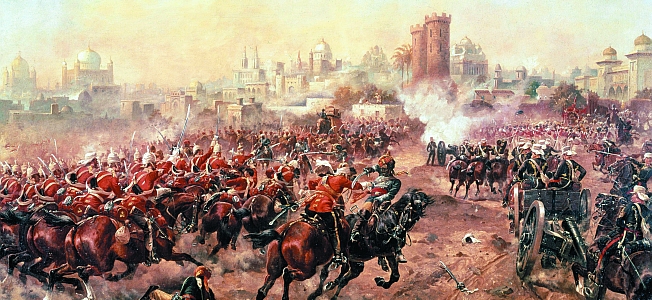 The rise of the Sipayas
The rise of the Sipayas
W 1857 r., above 50 years after the British occupied the entire country, the first major independence uprising took place. Until now, it is difficult to establish the real causes of the "Indian uprising", which are often referred to – especially in India – known as the "War of Independence". The cause of the outbreak was, among others. growth of British administration, the decline in the importance of local rulers and… grease used to lubricate weapons. Rumors spread, that they used pork and beef fat. There were many Muslims and Hindus in the ranks of the British Army, and pigs are unclean animals to the followers of Islam, while Hindu cows are worshiped as sacred animals. The British did not confirm these rumors, but neither did they disagree. So there was a revolt of Indian troops in the Bengali army. Out of 74 battalions only 7 (including one Gurkha battalion) left loyal to the British, 20 disarmed, a 47 has pronounced obedience. The uprising broke out in Mirata near Delhi and quickly spread to all of northern India. Long battles and sieges began. Both sides committed senseless massacres and acts of violence. The rebellion reached the northern part of the country. The uprising collapsed, having achieved no result. Although there were many outstanding commanders in the Indian ranks, there was no understanding between them and no awareness of a common purpose.
Consequences of the uprising
After the uprising ended, the British made two moves. Firstly, decided not to seek those responsible for these events, nor to resort to repression (as a result, this could not be completely prevented). Secondly, the East India Company was liquidated, whose powers were taken over by the government of Great Britain. The heyday of the empire, in which "the sun did not set", and of which India was a pride, was already a memory. Slow processes paved the way for India's independence, which took place at the end of the 19th century. Above all, The British gradually handed over power and allowed more and more people to make democratic decisions - obviously under the control of the government. The British administration began to hand over to the Indians jobs previously reserved for colonizers. At the same time, Hinduism flourished and grew stronger. During the reign of the Mughal and then British, it gradually lost its popularity, which was mainly associated with the fall of the Hindu states. Now is the time to take advantage of the boom and win back the faithful. The main opponents of the revival were the reformers Ram Mohan Roy, Rama Krishna Paramahansa and Swami Vivekananda, who have contributed to social change in India and laid the foundations for the current Hindu beliefs. Other activists, to which was Sri Aurobindo, they tried to reconcile Indian philosophy with the achievements of modern science. As a result of these attempts, it was established at the beginning of the 20th century. many religious groups, referring to Hinduism and pre-Christian European mysticism. It was then that the Theosophical Society Annie Besant and her guru Krishnamurti were founded. Aleister Crowley also owed a lot to these promoters of Indian philosophy.
The road to independence
At the beginning of the century, opposition to British rule grew. Congress, who was called, to give the Indians a substitute for power, he was becoming a real force. Many radical activists, outside of congress, postulated the struggle for independence using more radical measures. Eventually, the British decided to introduce this model of independence, which took place in Australia or Canada. However, World War I prevented the implementation of these projects, and the events in Muslim Turkey discouraged the followers of Islam in India from implementing the plans of the British. After the war, the fight resumed under the leadership of Mohandas Gandhi. W 1915 r. he returned from South Africa, where he worked as a lawyer, while fighting against discrimination against Indian emigrants. After 1919 r., in which the massacre of demonstrators in Amritsar took place, devoted himself to the fight for independence. Gandhi, nicknamed Mahatma ("Great spirit"), he adopted an attitude of passive resistance towards the British (satyagraha – "The power of truth"). The aim of his activities was to involve also peasants in the fight for independence. He organized protests against salt taxes, and boycotts of British fabrics. He was imprisoned many times because of his activities. Although not everyone supported his methods, it, however, remained, along with the National Congress, the leading force in the struggle for Indian independence. After the end of World War II, independence was a foregone conclusion. The war destroyed the myth of European domination and put an end to colonialism. The British could not hold such a huge empire. However, a new problem arose: a large Muslim minority realized, that after independence, India would be dominated by Hindus, who, despite Gandhi's tolerance, will not allow the followers of Islam to power.